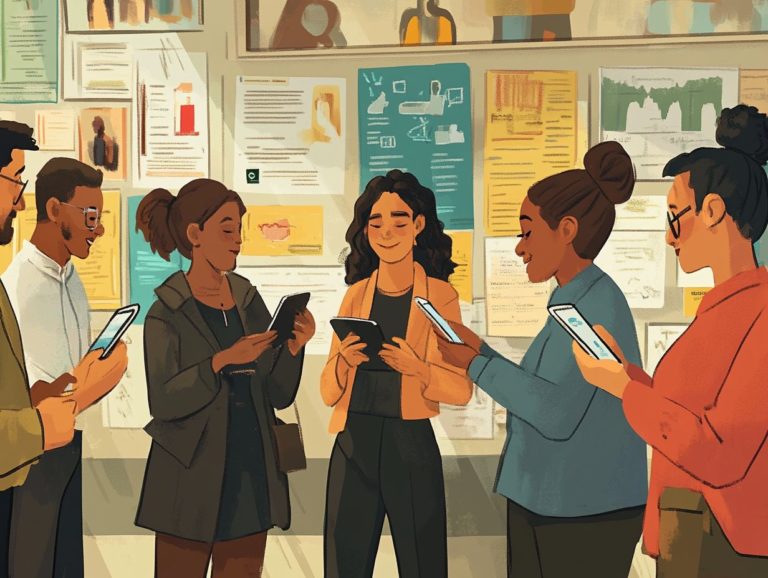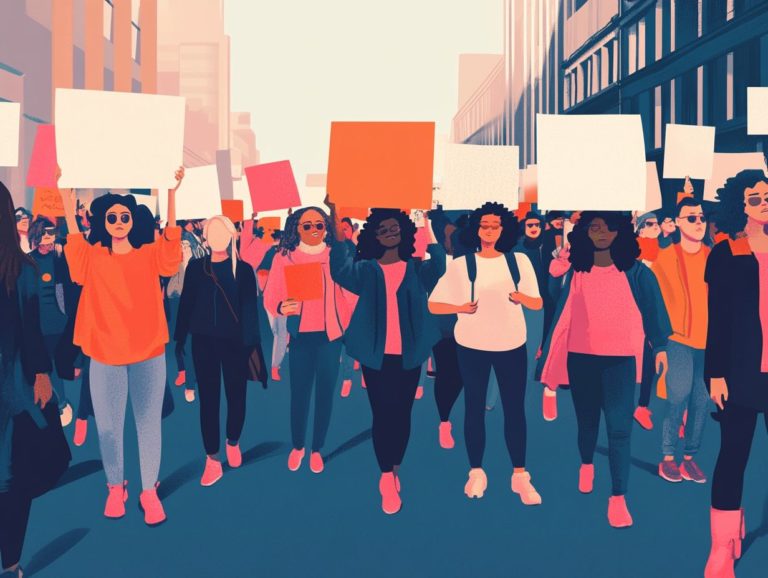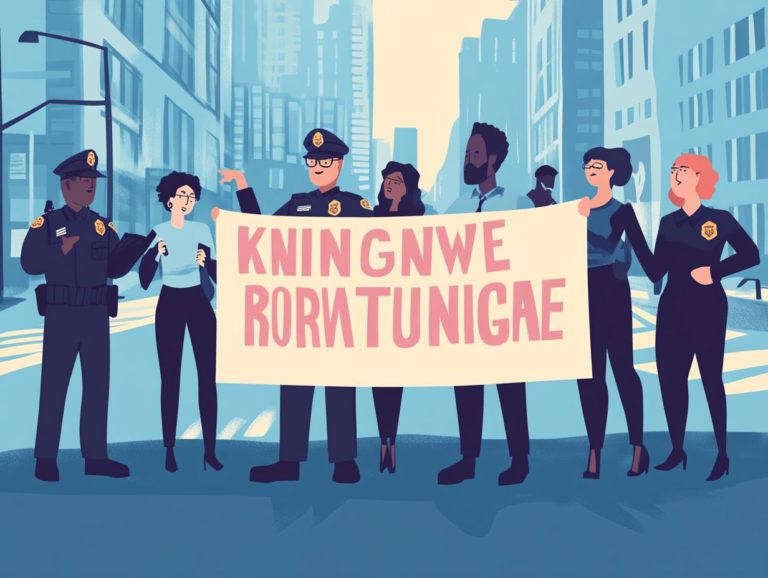Your Rights in Immigration Matters
Immigration law presents a complex landscape, brimming with regulations that influence the lives of millions.
This article demystifies the essentials of immigration laws and regulations. We ll delve into various types of immigration status and address the common challenges immigrants face today.
You ll discover your legal rights and the resources available to support you. With practical steps laid out for navigating the immigration process smoothly, you can make informed decisions every step of the way.
Contents
- Key Takeaways:
- Understanding Immigration Law
- Types of Immigration Status
- Common Immigration Issues
- Know Your Rights
- Resources for Immigrants
- Navigating the Immigration Process
- Frequently Asked Questions
- What are my rights in immigration matters?
- Can I be deported without a hearing?
- Do I have the right to an attorney in immigration matters?
- What if I am detained by immigration authorities?
- Can I be denied entry into the United States based on my religion or national origin?
- What can I do if I feel my rights have been violated in immigration matters?
Key Takeaways:

- Know your rights as an immigrant – you have legal protections and resources available to you.
- Understand the different types of immigration status, including visas, permanent residency, and citizenship.
- Be aware of common challenges and obstacles when navigating the immigration process.
- Seek out organizations and services for support.
Understanding Immigration Law
Understanding immigration law is essential for anyone, whether you re an immigrant or an advocate for their rights. This is particularly crucial in light of the ACLU s tireless efforts to ensure due process and uphold constitutional rights.
Let s dive into this critical exploration now! We will examine the intricate framework of immigration laws and regulations that govern immigrant status, the legal pathways available, and the challenges encountered in detention facilities throughout California, where ICE enforcement often collides with civil liberties.
By examining these critical issues, you can empower yourself to advocate effectively for humane treatment and meaningful immigration reform.
Overview of Immigration Laws and Regulations
The landscape of immigration laws and regulations provides a comprehensive framework that determines the immigration status of those seeking refuge or a fresh start in the United States. This includes individuals advocating for asylum, which is the right to seek protection in another country due to fear of persecution, and receiving legal support from organizations like the ACLU.
These laws play a key role in shaping the experiences of various groups, particularly undocumented immigrants who face the constant threat of deportation and asylum seekers navigating a perplexing legal maze.
Legal assistance is vital for understanding your rights and the procedures for obtaining or adjusting your immigration status. Organizations such as the ACLU actively work to uphold these regulations and combat unjust practices that threaten the dignity and security of vulnerable individuals.
By addressing systemic inequalities and advocating for fair treatment, their efforts significantly enrich the conversation surrounding immigration reform and human rights.
Types of Immigration Status
Types of immigration status vary significantly, encompassing categories such as visas, permanent residency, citizenship, asylum, and specialized options like the U visa.
Each category presents unique legal pathways and requirements for individuals aspiring to reside in the United States. Understanding these distinctions is crucial for effectively navigating the immigration landscape.
Visas, Permanent Residency, and Citizenship
Visas, permanent residency, and citizenship are vital aspects of your immigration status, shaping your legal standing and the rights that accompany it in the United States. Understanding the specific legal pathways to achieve these statuses is essential.
Navigating this intricate landscape may feel overwhelming, but grasping the different categories of visas such as work, student, and family reunification is crucial for any aspiring immigrant.
After securing a visa, the next step is pursuing permanent residency, which typically involves submitting an application, undergoing background checks, and demonstrating eligibility through employment or family connections.
Achieving citizenship entails additional steps, such as passing a civics test and meeting residency requirements. Each status provides distinct rights, including access to education and healthcare, significantly influencing your quality of life and ability to engage fully in society.
For support, don t hesitate to reach out to organizations that can help you understand your rights and navigate the immigration process.
Common Immigration Issues

Common immigration issues often present significant challenges, including unlawful detention, deportation, and the complexities of navigating bond hearings.
These challenges impact vulnerable populations significantly, particularly those with mental disabilities, and can infringe upon their due process rights, meaning the right to a fair legal process, as established under U.S. law.
Challenges and Obstacles Faced by Immigrants
Immigrants encounter many challenges and obstacles, such as unlawful detention and the looming threat of deportation. Hurdles in accessing legal assistance can be especially daunting for those with mental disabilities who need extra support to navigate the complexities of the immigration system.
These issues become more pronounced when compounded by social stigma and economic hardship, making it increasingly difficult for diverse immigrant populations to integrate into a new society.
Legal assistance is vital in addressing these challenges. Knowledgeable advocates empower individuals to understand their rights and the intricacies of immigration law.
Without proper guidance, you might struggle to file applications accurately or be unaware of the resources available to you. Ultimately, these obstacles impact not just legal status but also community cohesion and personal well-being.
Know Your Rights
Knowing your rights as an immigrant is crucial! This knowledge covers legal protections against unlawful detention and guarantees that your due process rights are respected.
It underscores a commitment to civil liberties that organizations like the ACLU fiercely advocate for.
Legal Protections for Immigrants
Legal protections for immigrants safeguard your due process rights and ensure your access to justice. This framework is vital for civil liberties that organizations like the ACLU work tirelessly to uphold.
These protections cover a broad spectrum of constitutional rights, including your right to a fair hearing and freedom from arbitrary detention. Many laws exist to ensure everyone is treated equally, helping you navigate legal systems without fear of injustice.
The ACLU has taken on policies that infringe upon these rights, advocating for those in vulnerable positions. Their relentless efforts have resulted in landmark cases that protect individuals from unlawful deportation and workplace exploitation. This highlights the ongoing need for activism in the pursuit of civil liberties for everyone.
Resources for Immigrants
Resources for immigrants are abundant! Act now to access the help you need. Numerous organizations offer crucial legal assistance, advocacy, and public outreach.
These resources aim to support individuals as they navigate the intricate and often challenging landscape of immigration processes.
Organizations and Services Available

- ACLU
- National Immigration Project
- United We Dream
These organizations are dedicated to offering legal assistance and advocacy to uphold the rights of immigrants across the United States. They play a crucial role in helping you navigate the complex landscape of immigration law, empowering you through legal representation and resources.
The ACLU fights for civil liberties and challenges unjust policies that may impact you. Meanwhile, the National Immigration Project specializes in providing comprehensive legal support for those facing the threat of deportation. United We Dream engages in grassroots organizing to mobilize young immigrants like yourself to advocate for systemic change.
Together, these organizations work tirelessly to dismantle barriers, ensuring you can access the legal help you need to secure your future and uphold your dignity.
Navigating the immigration process requires you to grasp the essential steps involved, sidestep common pitfalls, and seek legal assistance when necessary.
This approach will help ensure a seamless experience during crucial moments, such as bond hearings and immigration proceedings.
Steps to Take and Mistakes to Avoid
Understanding the steps you need to take and the common mistakes to avoid during the immigration process can significantly impact your chances of success. This is where legal assistance becomes invaluable, especially in critical situations like bond hearings.
Navigating the immigration system can feel like traversing a labyrinth filled with endless forms, deadlines, and legal requirements. It s easy to underestimate the intricacies of documentation or overlook essential details, which could delay or jeopardize your application.
For example, failing to provide complete evidence of eligibility or misinterpreting procedural timelines can lead to unnecessary complications. Stay vigilant about potential pitfalls, such as changes in immigration policies or misunderstandings regarding eligibility criteria.
Hiring a lawyer can help you understand these issues and present your case effectively. This not only boosts your chances of approval but also protects you from preventable errors that could derail your aspirations.
Frequently Asked Questions
What are my rights in immigration matters?
As an immigrant, you have the right to due process and fair treatment under the law. This includes the right to an attorney, the right to a hearing before a judge, and the right to challenge any decisions made by immigration authorities.
Can I be deported without a hearing?

No, you have the right to a hearing before a judge before any deportation proceedings can take place. This allows you to present your case and potentially challenge the reasons for your deportation.
Do I have the right to an attorney in immigration matters?
Yes, you have the right to hire an attorney to represent you in immigration proceedings. If you cannot afford an attorney, you may be eligible for free or low-cost legal services through organizations such as the American Immigration Lawyers Association or your local legal aid office.
If you are detained by immigration authorities, you have the right to know why you are being detained, the right to a bond hearing, and the right to contact an attorney. It is important to remain calm and not sign any documents without first consulting with an attorney.
Can I be denied entry into the United States based on my religion or national origin?
No, it is illegal for immigration authorities to deny entry into the United States solely based on religion or national origin. If you believe you have been discriminated against, you have the right to file a complaint with the appropriate authorities.
What can I do if I feel my rights have been violated in immigration matters?
If you believe your rights have been violated, contact an experienced immigration attorney immediately. They can help you understand your rights and explore any legal options you may have to protect them. You may also file a complaint with the appropriate authorities.






